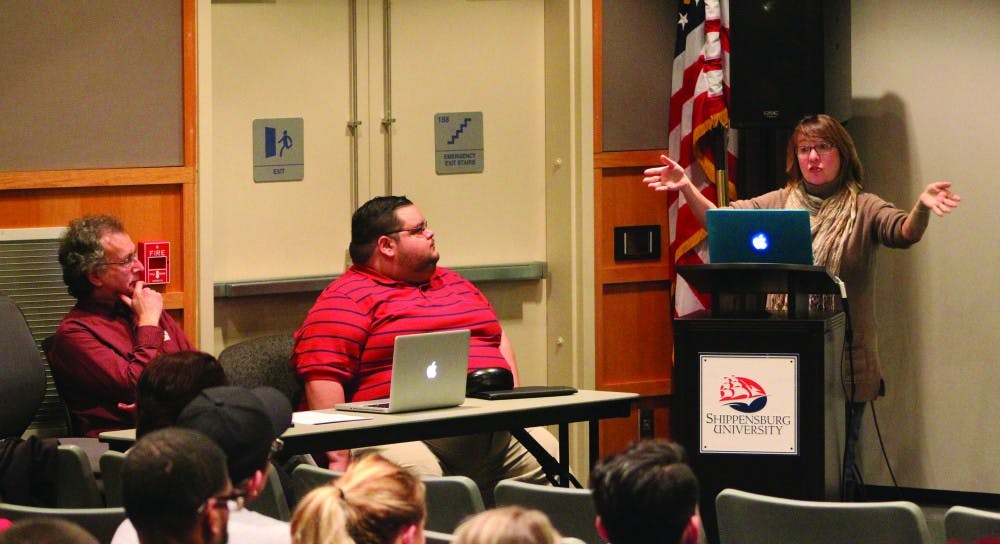Researchers and experts tackled complex facets of immigration with Shippensburg University students on Feb. 14, saying that migrating across borders is a difficult process, with possible mental health consequences.
Dozens of students gathered in SU’s Orndorff Theatre to listen to Debra Cornelius, SU professor of sociology; Gilberto Lopez, Harvard doctor of science degree candidate; and Robert Shaffer, SU professor of history.
“People in Mexico don’t want to go to the U.S.,” Cornelius said, drawing on her experience from sociological research she performed in Mexico and the U.S. “Everyone I talked to said, ‘I have to go because.’”
The reasons why Mexicans felt they had to migrate to the U.S. varied from getting better wages to reuniting with their families, Cornelius said. Crossing the U.S.-Mexican border is a challenge for migrants that do it illegally, because human smugglers are expensive and some people think that jobs will be hard to find in the U.S.
“A lot of people don’t migrate because they don’t always have the money to migrate,” Cornelius said. Part of the reason for this is that the North American Free Trade Agreement devastated the Mexican economy, driving some wages down to less than $1 an hour. One problem with migrating legally is that in the past few years the maximum amount of immigrants allowed to enter the U.S. was reached in a matter of days.
Another issue with migration that can serve as a deterrent is mental health problems, Lopez said, who investigated the issue. Lopez was part of a team of researchers that gathered information from hundreds of Mexicans on both sides of the border, and found evidence that supports a correlation between family separation and poor mental health.
“Being separated from your family and not having the resources to go see them — that seems to be the issue there,” Lopez said. The research involved surveying and interviewing migrants, non-migrants and return migrants to, in part, score them on the likelihood of experiencing mental health problems.
Some people will migrate to the U.S. and return to their families in Mexico on a seasonal basis, but sometimes they are stuck on one side of the border, Lopez said. Torn families that experience depression and anxiety often find it difficult to get professional help. In the region Lopez focused on, he said even the closest psychologist and psychiatrist were too far away, and possibly too expensive, for most people to use.
Immigration is not only on the minds of Mexicans, but it is a hot-button issue for Americans as well, Cornelius said. U.S. immigration policies under President Barack Obama’s administration are costing the country tens of millions of dollars a year to deport migrants and to build fences and surveillance equipment. She said the issue extends to Republican presidential candidates, who said they plan to double or triple border patrols and build a wall stretching the length of the border.
Shaffer said U.S. immigration policy has dramatically changed over the decades, citing the Immigration and Nationality Act (Hart-Cellar Act) of 1965, as an example. The U.S. maintained strict policies in the beginning of the 20th century that limited the ethnic groups and number of people that could journey to the country.
This changed, however, when it benefited the U.S., Shaffer said, citing the Chinese as an example. The Chinese were largely blocked from migrating to the U.S. in the 1900s, until the U.S. wanted to build a relationship with them during World War II.
When Congress passed the Hart-Cellar Act, the immigration policy dramatically changed, and it laid the groundwork for modern-day policies.
“I think it has served its function of justice in removing blatant racial discrimination,” Shaffer said, noting the legislation made strides toward equality, but was not perfect.
Shaffer, Cornelius and Lopez said immigration is a highly debated topic in the U.S. because of its economic impact on the country. While one claim is that migrants are taking jobs away from Americans and not paying taxes, Cornelius said that is not entirely accurate.
“They pay taxes,” she said. “They pay income tax, and when they buy something at the store they pay sales tax.”
Additionally, she said migrants take manual labor jobs that Americans often pass up, growing businesses and creating job openings that students want.
“Every time you put a strawberry in your mouth,” she said,” somebody from the Central Valley [of California], picked that strawberry with their hands.”





The Slate welcomes thoughtful discussion on all of our stories, but please keep comments civil and on-topic. Read our full guidelines here.